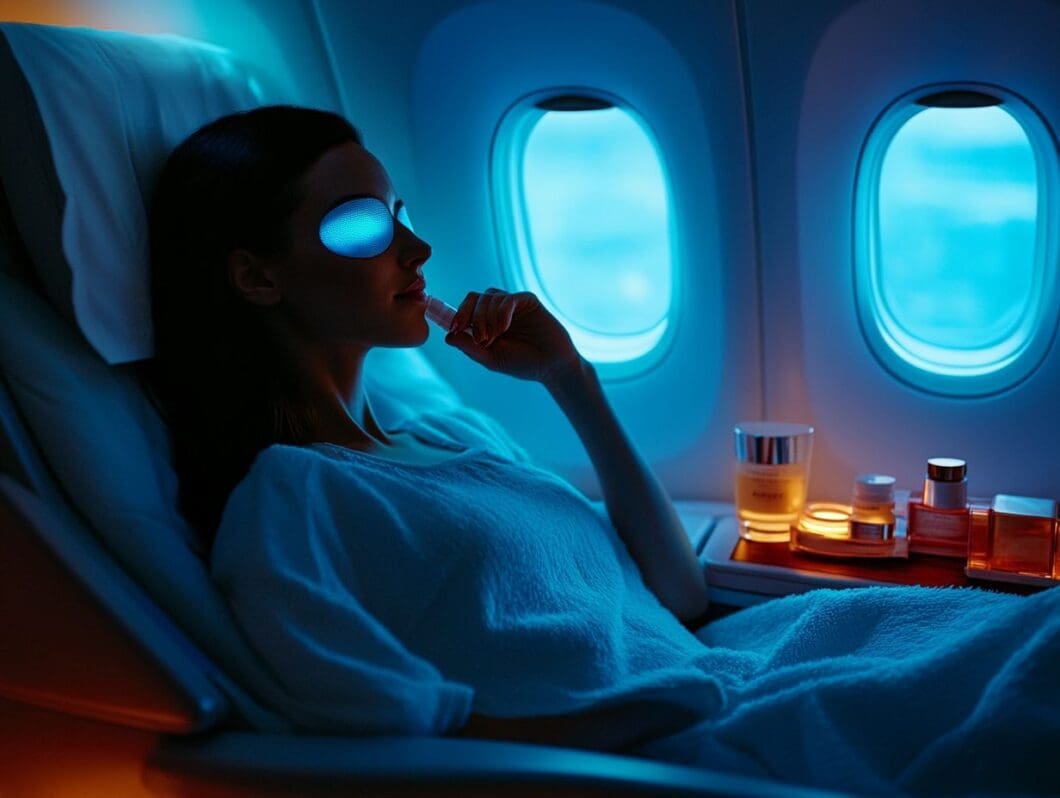Long-haul flights can take a toll on your skin and overall well-being, leaving you feeling drained and less than refreshed upon arrival.
This guide helps you navigate the challenges of air travel while maintaining your beauty and comfort.
From pre-flight skincare routines to in-flight makeup tips and post-flight recovery strategies, we cover everything you need to know for a smooth journey.
Get ready to land looking and feeling your best!
Key Takeaways:
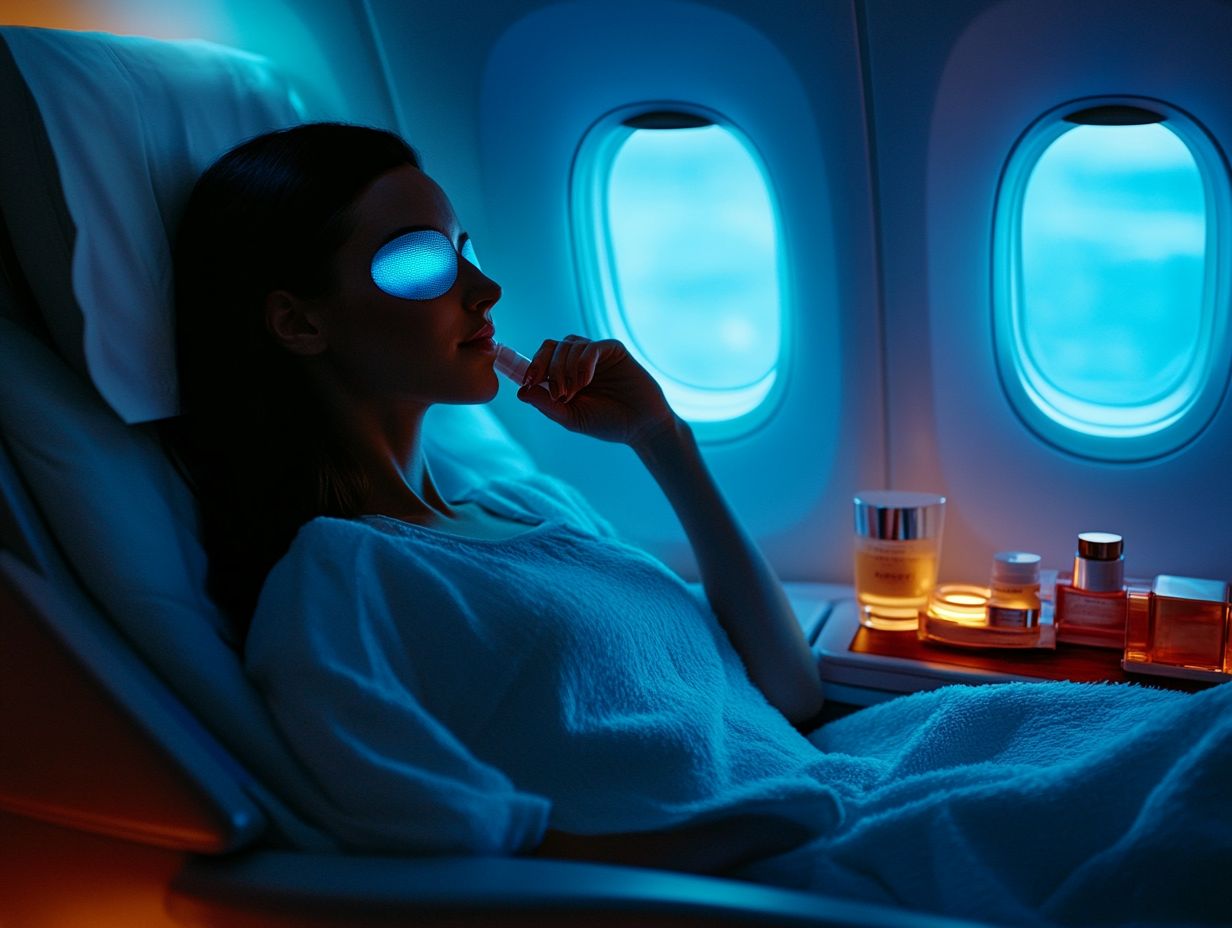
Pre-flight Preparation
Pre-flight preparation is essential for facilitating a smooth and comfortable journey, particularly for long-haul flights that can significantly affect hydration, skincare, and overall wellness. By meticulously planning one’s skincare regimen and dietary choices, travelers can arrive at their destination feeling revitalized and energized.
Experts such as Dr. Shelby Harris and Mila Moursi underscore the importance of maintaining moisture levels and proper hydration through the careful selection of nutritious snacks and sufficient water intake to mitigate the effects of cabin pressure and jet lag.
Skincare Routine and Hydration
Establishing a comprehensive skincare routine prior to a flight is vital for maintaining hydration and ensuring that the skin appears radiant and healthy upon arrival. By integrating moisturizing products such as serums, face masks, and nourishing oils, individuals can effectively counteract the dryness commonly associated with the cabin environment.
Incorporating cleansing wipes into the routine serves to remove impurities and refresh the skin, making them an essential travel companion. Following this, the application of a hydrating toner aids in locking in moisture, thus preparing the skin for subsequent steps.
Additionally, the inclusion of facial oils rich in antioxidants not only nourishes the skin but also provides a protective barrier against environmental stressors. Probiotics can further enhance the skin’s resilience during travel.
By selecting products that combine hydration with these active ingredients, travelers can support their skin’s health and maintain a luminous appearance throughout their journey.
In-flight Skincare
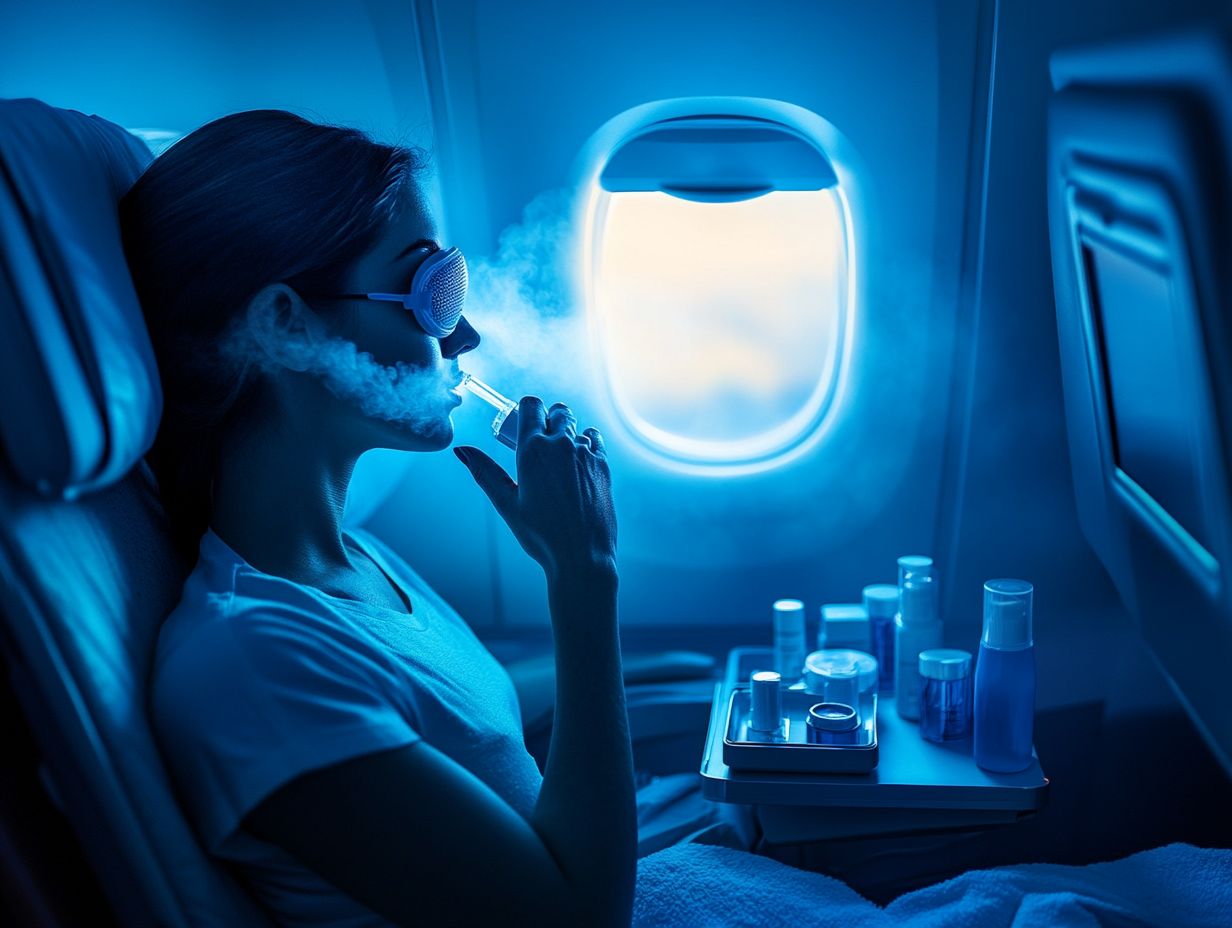
In-flight skincare is essential for preserving skin health during long-haul flights, as the low humidity levels can lead to dehydration and discomfort.
By utilizing appropriate products and techniques, such as applying a hydrating face mask and incorporating essential oils for soothing effects, travelers can effectively safeguard their skin and promote self-care throughout their journey.
Products and Techniques for Hydrated Skin
Utilizing the appropriate products and techniques is essential for achieving hydrated skin during travel, particularly on long-haul flights. The application of a rich lip balm, hydrating eye cream, and the regular practice of self-massage can effectively maintain moisture levels and prevent dryness. For more tips, check out Beauty Tips for Surviving a Long-Haul Flight.
Incorporating a lightweight facial mist can deliver instant hydration, while essential oils in an aromatherapy roller can provide soothing effects and enhance overall well-being. By implementing a consistent skincare routine throughout the flight, individuals can mitigate the effects of the cabin’s dry air, which frequently depletes the skin of its natural moisture.
Employing self-massage techniques, such as applying gentle pressure to key pressure points, can stimulate circulation and promote lymphatic drainage. This approach not only revitalizes the complexion but also contributes to relaxation, thereby enhancing the overall travel experience.
By prioritizing these methods, individuals can ensure their skin remains supple and radiant, even after extended periods in transit.
Makeup Tips for Long-haul Flights
In the context of long-haul flights, the application of targeted makeup tips can effectively reduce the impact of cabin pressure on the skin, contributing to a refreshed appearance upon arrival.
Selecting hydrating foundations, moisturizing primers, and lightweight products can enhance one’s travel beauty regimen, ensuring that the skin remains nourished and radiant throughout the journey.
Minimizing the Effects of Cabin Pressure
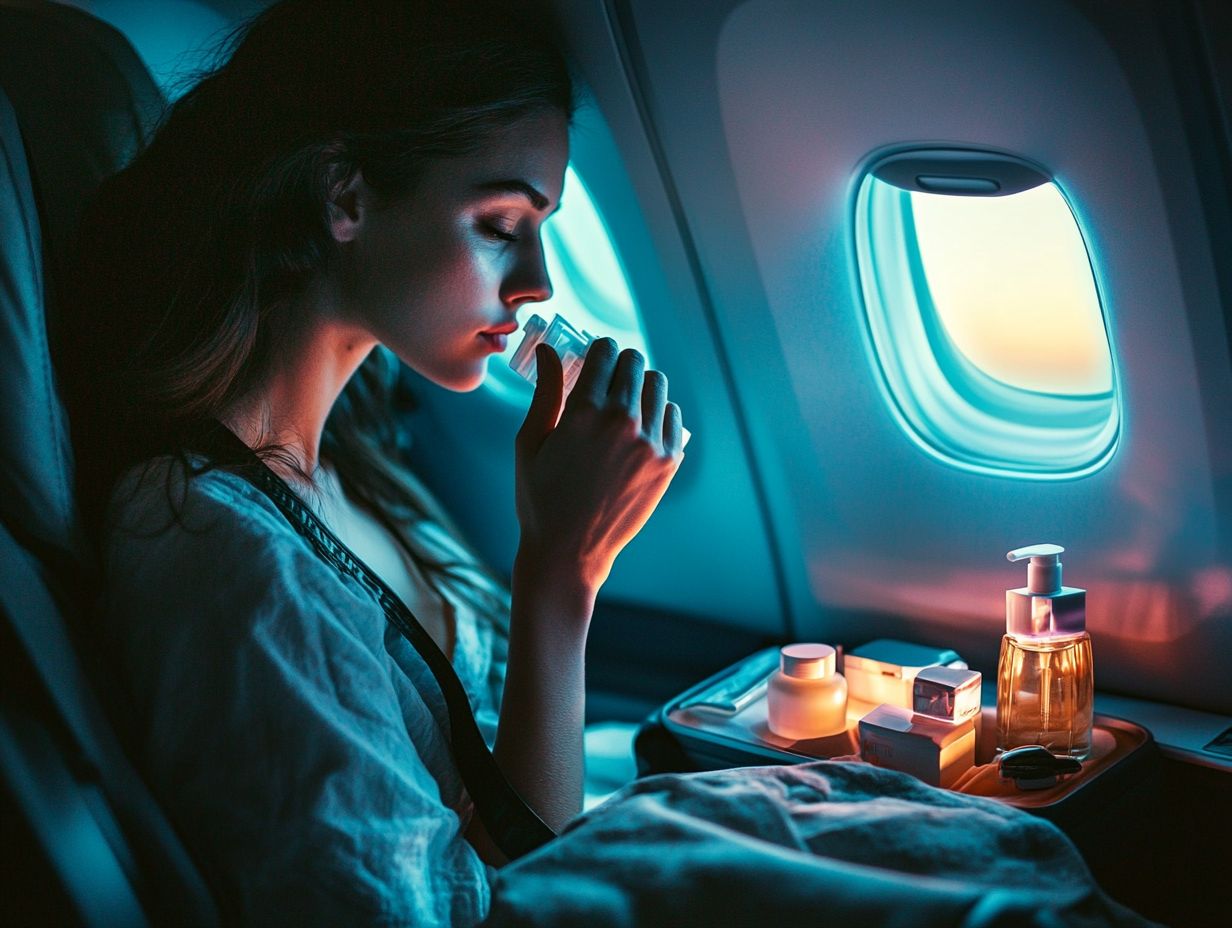
Minimizing the effects of cabin pressure during flights is crucial for maintaining hydration and overall skin condition, particularly when addressing jet lag. Implementing a customized skincare routine that includes soothing and moisturizing products can significantly enhance your skin’s appearance upon arrival. For more advice, check out these Beauty Tips for Surviving a Long-Haul Flight.
To effectively combat dryness and fatigue, it is advisable to carry a high-quality facial mist, which can provide instantaneous hydration throughout the flight. Additionally, applying a nourishing lip balm is essential for protecting the lips from the drying effects of cabin air.
Maintaining internal hydration is equally important; consuming ample water before and during the flight, while limiting excessive caffeine and alcohol intake, will aid in sustaining the body’s moisture levels.
To mitigate jet lag, consider adjusting your sleep schedule a few days prior to travel, exposing yourself to natural light upon arrival, and employing strategies such as timed melatonin supplements to help stabilize your sleep-wake cycle.
Staying Comfortable on the Flight
Maintaining comfort during a flight is crucial for an enjoyable travel experience, particularly on long-haul journeys where cabin conditions may be less than ideal.
By choosing appropriate clothing and accessories, such as breathable fabrics and a U-shaped pillow, travelers can significantly enhance their overall comfort.
Additionally, incorporating nutritious snacks can help sustain energy levels throughout the duration of the flight.
Choosing the Right Clothing and Accessories
Selecting appropriate clothing and accessories for air travel can significantly enhance both comfort and the overall travel experience. Choosing breathable fabrics, layering options, and essential items such as a U-shaped travel pillow will facilitate relaxation throughout the journey.
When determining the ideal travel outfit, it is advisable to opt for soft, stretchy materials like cotton blends or modal, which allow for ease of movement. A lightweight cardigan or oversized scarf can function as a versatile layering piece, suitable for adjusting to fluctuating cabin temperatures.
Comfortable pants, such as joggers or leggings, are recommended as they provide flexibility and warmth while maintaining a sense of style. It is also prudent to pair these with supportive footwear, such as slip-on sneakers, which can be conveniently removed during security screenings.
Additionally, incorporating accessories such as noise-canceling headphones and an eye mask can further enhance the travel experience, transforming a potentially lengthy flight into a more enjoyable and serene endeavor.
Post-flight Recovery
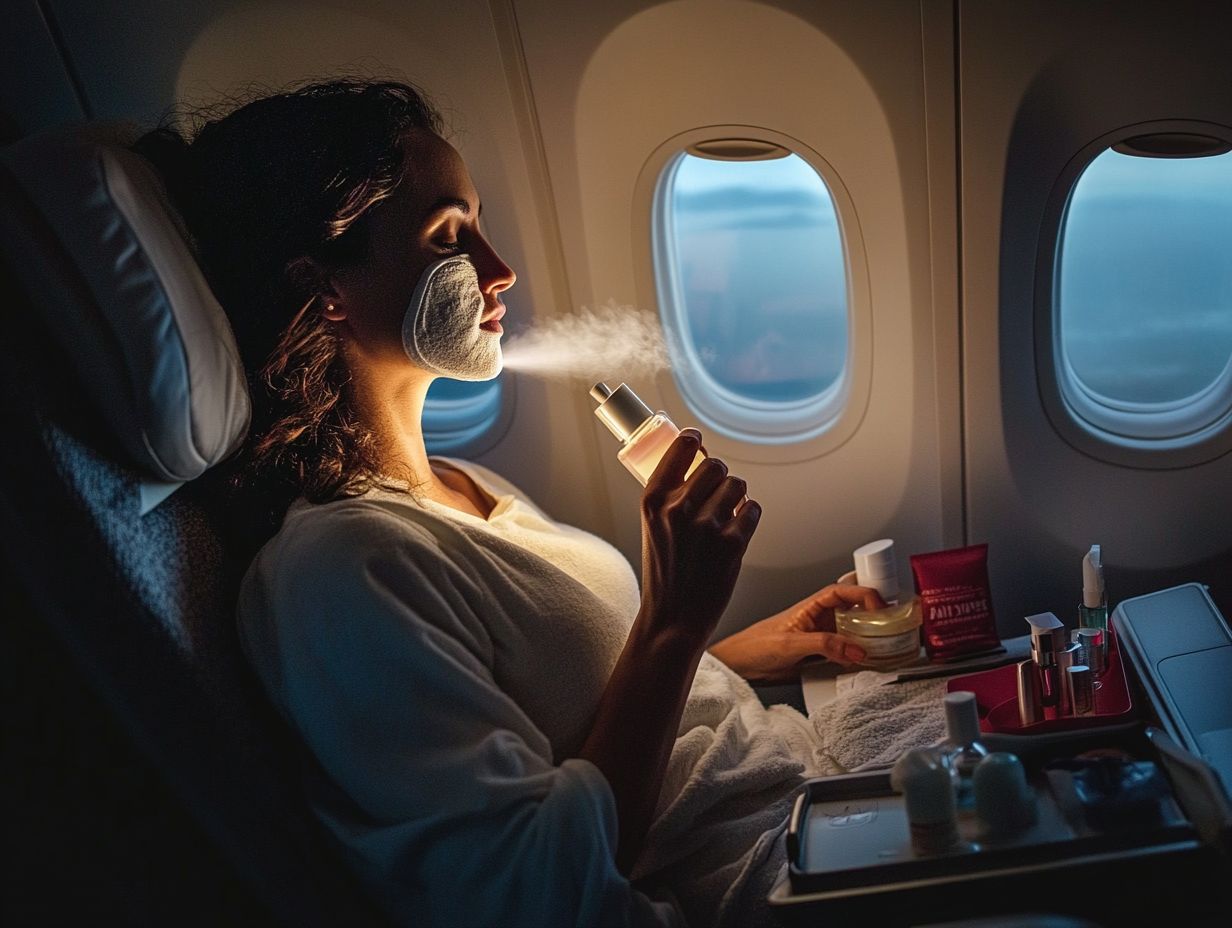
Post-flight recovery is essential for restoring both skin and body after an extended flight, as the transition frequently results in dehydration and fatigue.
Implementing a targeted skincare regimen that emphasizes hydration and nourishment can significantly enhance skin health and overall appearance upon reaching your destination.
Restoring Skin and Body After a Long Flight
Restoring the skin and body after a long flight requires a systematic approach focused on hydration and nourishment, utilizing effective skincare products that promote healing and vitality. Incorporating moisturizing creams, serums rich in antioxidants, and probiotics can significantly enhance the recovery process.
To achieve optimal results, it is advisable to apply a deep-hydrating face mask infused with hyaluronic acid, as this ingredient effectively draws moisture into the skin and combats dryness. Additionally, selecting body oils containing natural ingredients such as jojoba and vitamin E can restore suppleness and smoothness to the skin.
It is also important to consider the benefits of a nutrient-rich diet. Including probiotic-rich foods such as yogurt and kimchi can support gut health, further facilitating rejuvenation. Furthermore, antioxidants found in berries and green tea provide a protective barrier against oxidative stress, thereby assisting the skin in recovering and regaining its natural glow in a timely manner.
Tips for a Refreshed Arrival
Achieving a refreshed state upon arrival after a long flight necessitates strategic planning and practices designed to mitigate jet lag and fatigue.
By prioritizing hydration, optimizing sleep patterns, and consulting wellness experts for guidance on melatonin usage, individuals can significantly enhance their overall travel experience.
Combatting Jet Lag and Fatigue
Combating jet lag and fatigue requires a comprehensive approach that emphasizes hydration, sleep management, and the strategic use of supplements such as melatonin. Implementing wellness practices and travel strategies can substantially alleviate the effects of long-distance travel on the body’s internal clock.
To effectively address jet lag, travelers should prioritize hydration before, during, and after their flights. Adequate water intake can counteract the dehydrating effects of cabin air and support overall physiological functions.
Optimizing sleep patterns by gradually adjusting sleep schedules to align with the destination’s time zone proves advantageous. The judicious use of melatonin, administered at appropriate intervals, may assist in resetting the internal clock.
Additionally, incorporating exposure to light—either through natural sunlight or specialized lamps—can improve sleep quality. Dietary considerations, such as avoiding heavy meals close to bedtime, alongside relaxation techniques like meditation and gentle stretching, can further support recovery, enabling individuals to recuperate and regain their energy more efficiently.


